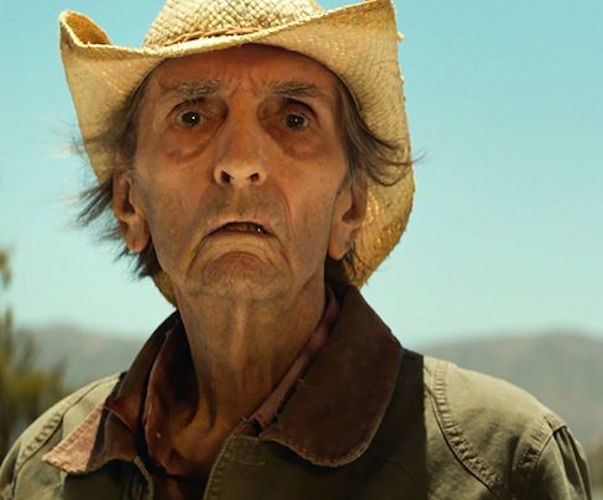Film Review: “Lucky” — Harry Dean Stanton, Living Large
Lucky is a showcase for Harry Dean Stanton’s unique talents, which primarily lie in his inhabiting roles as an amped-up or quirkier version of himself.
Lucky, directed by John Carroll Lynch. Screening at Kendall Square Cinema, Cambridge, MA

Harry Dean Stanton in “Lucky.”
By Peg Aloi
Harry Dean Stanton’s recent death at the age of 91 was hardly a shock, but how many actors are still making movies into their ninth decade? Stanton’s swan song is a charming and occasionally deep piece that was written just for him by his long time assistant Logan Sparks, and Stanton’s friend actor Drago Sumonja; in fact, the film is almost like a friendly send-off, a party featuring friends and collaborators of the actor, like Tom Skerritt (who last acted with Stanton in 1979 in Aliens), Ed Begley, Jr., David Lynch (who directed Stanton in Wild at Heart, Fire Walk With Me, and Inland Empire), Beth Grant, and others.
First-time director John Carroll Lynch is himself an iconic actor in the mold of Stanton; he often plays (memorably) disturbing character roles, like the killer in Zodiac, a murderous mercenary doing the bidding of an evil preacher in Carnivàle, or Twisty the Clown in American Horror Story. No surprise, then, that Lucky is a showcase for Stanton’s unique talents, which primarily lie in his inhabiting roles as an amped-up or quirkier version of himself.
Stanton was never what one would call a character actor. Every role he took on turned out to be a pure version of Harry Dean Stanton: his laconic speaking voice, craggy face, lean, lanky figure, and attitude-to spare, ranging from the cajoling to the curmudgeonly. In Alex Cox’s Repo Man, Stanton was grouchy, manipulative, and disillusioned; in David Lynch’s Wild at Heart, he played a sort of black-hearted love interest (Diane Ladd’s swain and partner in crime); in Paris, TX, co-written by Sam Shepard, who passed away two weeks before Stanton, he was the embodiment of a lonely, dissolute landscape. Lucky seems to be in the mode of the latter: set in the Arizona desert, the dry climate and dusty vistas seem to be a fitting place for a very old man who knows death is not far off, whose vitality is slowly draining away.
Lucky is an endearing, down to earth farewell: Stanton’s iconoclastic persona shimmers gently throughout the somewhat rambling, low-key story. The opening shots are comical and intriguing: jaunty music plays while Stanton, as the title character, does his morning exercises in his underwear. He’s not exactly graceful, but he’s remarkably limber for a man of his age. Lucky is the picture of dogged health (despite smoking like a chimney), and viewers might wonder if the actor made use of a similar routine in his own life. Lucky’s life is prosaic; he goes to the diner every day to chat with friends like Howard (David Lynch), who worries that Mr. Roosevelt, his ancient tortoise, has gone missing. (This sage metaphor appears to Lucky at the film’s end, bringing not so much wisdom as reassurance). Lucky bemoans absent friends who have already passed on, walks to do his errands, enjoys the vast, spare landscape (its beauty a somber backdrop for his aging body), and ruminates silently on things that he encounters. At a party, he sings in Spanish (soulfully and without a touch of self-consciousness). When he falls from a dizzy spell, his doctor can find no specific cause — other than old age. “I’m afraid,” Lucky says to the kind diner waitress (Yvonne Huff), who, despite her affection for Lucky, can’t think of what to say beyond an awkward, “I know.”
Lucky is thought-provoking, but not preachy or precious. It unfolds naturalistically, despite the upbeat opening and occasionally showy editing. Lynch’s directing debut is competent — not self-conscious, but happy to let its aged star shine on one more time, humbly, and with a light whose tarnish is poignantly familiar. Stanton’s turn as Lucky is moving but never fancy, although one sometimes wishes for the kind of sharp dialogue that would let the actor show off his witty timing. If there are any heavy duty messages here (about dying, or regrets, or spirituality), the film doesn’t dwell on them. Lucky is an admitted atheist, but doesn’t much care whether oblivion awaits; instead he seems to want to ponder the immediacy of the day before him, getting through it one step — and one epiphany — at a time.
Peg Aloi is a former film critic for The Boston Phoenix. She taught film and TV studies for ten years at Emerson College, and currently teaches at SUNY New Paltz. Her reviews also appear regularly online for The Orlando Weekly and Diabolique. Her long-running media blog “The Witching Hour” has recently been moved to a new domain: themediawitch.com.

